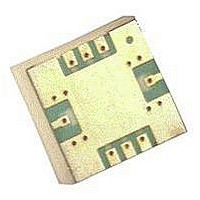AMMP-6232-TR1G Avago Technologies US Inc., AMMP-6232-TR1G Datasheet - Page 8

AMMP-6232-TR1G
Manufacturer Part Number
AMMP-6232-TR1G
Description
IC MMIC AMP LNA 18GHZ-32GHZ 8SMD
Manufacturer
Avago Technologies US Inc.
Datasheet
1.AMMP-6232-TR2G.pdf
(9 pages)
Specifications of AMMP-6232-TR1G
Rf Type
WiMax
Gain
23dB
Current - Supply
135mA
Frequency
18GHz ~ 32GHz
Noise Figure
3dB
P1db
18dBm
Package / Case
8-SMD
Voltage - Supply
3 V ~ 5 V
Frequency Rf
32GHz
Noise Figure Typ
3dB
Supply Current
135mA
Supply Voltage Range
3V To 5V
Frequency Max
32GHz
Termination Type
SMD
Number Of Channels
1
Frequency (max)
32GHz
Power Supply Requirement
Single
Single Supply Voltage (min)
3V
Single Supply Voltage (typ)
4V
Single Supply Voltage (max)
5V
Package Type
SMT
Dual Supply Voltage (min)
Not RequiredV
Dual Supply Voltage (typ)
Not RequiredV
Dual Supply Voltage (max)
Not RequiredV
Pin Count
8
Mounting
Surface Mount
Filter Terminals
SMD
Rohs Compliant
Yes
Frequency Min
18GHz
Lead Free Status / RoHS Status
Lead free / RoHS Compliant
Test Frequency
-
Lead Free Status / Rohs Status
Compliant
Available stocks
Company
Part Number
Manufacturer
Quantity
Price
Part Number:
AMMP-6232-TR1G
Manufacturer:
AVAGO/安华高
Quantity:
20 000
Manual Assembly
x Follow ESD precautions while handling packages.
x Handling should be along the edges with tweezers.
x Recommended attachment is conductive solder paste.
x Apply solder paste using a stencil printer or dot
x Follow solder paste and vendor’s recommendations
x Packages have been qualified to withstand a peak
AMMP-6232 Part Number Ordering Information
8
Figure 23. Suggested Lead-Free Reflow Profile for SnAgCu Solder Paste
Part Number
AMMP-6232-BLKG
AMMP-6232-TR1G
AMMP-6232-TR2G
Please see recommended solder reflow profile. Neither
Conductive epoxy or hand soldering is recommended.
placement.
dependent on PCB and component layout and should
be controlled to ensure consistent mechanical and
electrical performance.
when developing a solder reflow profile. A standard
profile will have a steady ramp up from room
temperature to the pre-heat temp. to avoid damage
due to thermal shock.
temperature of 260°C for 20 seconds. Verify that the
profile will not expose device beyond these limits.
300
250
200
150
100
50
0
0
Ramp 1 Preheat Ramp 2 Reflow
50
The volume of solder paste will be
Peak = 250 ± 5˚C
100
Devices Per
Container
10
100
500
Seconds
150
Melting point = 218˚C
200
Container
Antistatic bag
7” Reel
7” Reel
Cooling
250
300
A properly designed solder screen or stencil is required to
ensure optimum amount of solder paste is deposited onto
the PCB pads. The recommended stencil layout is shown
in Figure 22. The stencil has a solder paste deposition
opening approximately 70% to 90% of the PCB pad.
Reducing stencil opening can potentially generate more
voids underneath. On the other hand, stencil openings
larger than 100% will lead to excessive solder paste smear
or bridging across the I/O pads. Considering the fact that
solder paste thickness will directly affect the quality of
the solder joint, a good choice is to use a laser cut stencil
composed of 0.127mm (5 mils) thick stainless steel which
is capable of producing the required fine stencil outline.
The most commonly used solder reflow method is
accomplished in a belt furnace using convection heat
transfer. The suggested reflow profile for automated
reflow processes is shown in Figure 23. This profile is
designed to ensure reliable finished joints. However, the
profile indicated in Figure 1 will vary among different
solder pastes from different manufacturers and is shown
here for reference only.





















